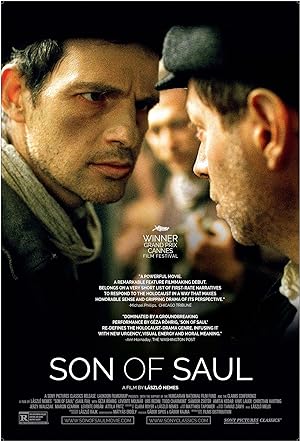Son of Saul focuses on a Jewish Hungarian prisoner of Auschwitz who works in the gas chambers, called Sonderkommando, and is suddenly spurred into a specific act of rebellion when he wants to find a rabbi to bury a young boy. Son of Saul is set in the midst of a historical rebellion by Sonderkommandos in Auschwitz in 1944, and Saul has to navigate the inhumane terrors of being a prisoner of the Nazis and the logistics of rebellion of his fellow prisoners. The other Sonderkommandos appear to consider him at best as a man driven to madness by the Nazis who must be tolerated and cared for or at worst a nuisance who will ruin their plans. Will any of the rebellions succeed?
As an American, what gets lost in translation is the ability to navigate the different languages and accents. Everything just sounds foreign to me, but I imagine that a European viewer can distinguish where each character is from just by listening, and that ability must add to the texture and tension of Son of Saul.
I always feel wary when someone has a fictional take on the Holocaust. Any fictional take on a horrific tragedy runs the risk of revictimizing by marginalizing historical identities and stories. I brought that reservation to my viewing of Son of Saul, but was optimistc because Hungarian films are usually amazing. Son of Saul has an Alejandro González Iñárritu of The Revenant feel. Son of Saul’s camera is constantly in momentum and selectively chooses to keep some excitement at the edges of the screen, specifically blurred, while focusing on the back of its main character.
On one hand, I think that Son of Saul does a great job of showing how revolutionary it is to honor God and another human being by practicing your religious beliefs and burying them instead of disposing them, especially since that is the opposite of what Saul is supposed to do as a Sonderkommando. Son of Saul evokes many amazing images of baptism and obviously the title.
On the other hand, it feels wrong. Why not focus on a historical Sonderkommando who was actually part of the rebellion? It feels like Son of Saul is literally blurring and marginalizing the real people and their revolt and privileging the fictional while benefiting from the historical reality suffered by those people. Saul’s choice to focus on a dead body, even if he believed it was someone that he loved, over living people seems wrong, but if he is mad, it is understandable.
After seeing Son of Saul, I found out that it was not the first movie set during the Sonderkommandos’ rebellion in Auschwitz. So I will check out The Grey Zone and compare movies at a later date.
Stay In The Know
Join my mailing list to get updates about recent reviews, upcoming speaking engagements, and film news.





